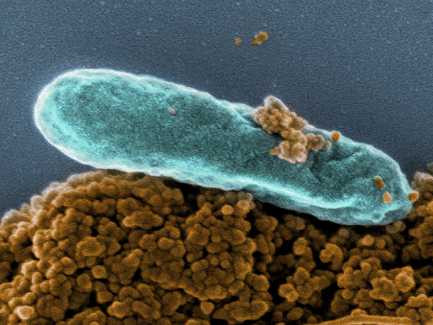Shewanella: Electricity-Producing Bacteria to Power Future Space Missions
Scientists at NASA’S Ames Research Center in California are exploring electric current-generating bacteria called Shewanella oneidensis MR-1, which could potentially aid future space missions.
Apparently, humans are not the only ones who can harness electricity. Scientists have found out a new kind of bacteria that generates electricity. At present, scientists are testing whether these bacteria could generate electricity in outer space as it does on earth. If positive, scientists could use them to treat wastewater, produce medicines or power up systems for space missions.
Like humans, Shewanella breathes in oxygen which allows it to transfer electrons from 
What makes these bacteria unique is the ability to generate oxygen on their own. So when the environment is low on oxygen, they continue producing energy by using metals like iron and manganese, instead of oxygen.
A group of scientists from Space Bioscience Division at Ames, led by John Hogan and Michael Dougherty had been studying the bacteria’s mechanism to determine which genes could help survive space environment, where oxygen supply is ultimately low. In their study, the team has revealed that
the bacteria mimic a formation like that biofilms. In a biofilm, individual bacterium sticks together and make direct contact with each other similar to teeth plaques and soap scums.Shewanella, generally forms biofilms on metal-containing surfaces like rocks through their nanowires – an incredibly thin appendages measuring approximately 10 nanometers that transmit electricity. Scientists have compared the bacteria’s capability like a charger cord which carries electricity from the socket to recharge phone batteries.
These unique abilities have motivated researchers to see how they could be put to use. Scientists are hopeful that they could replicate Shewanella’s electric-producing capabilities to develop microbial fuel cells that astronauts can use in space to produce their own resources for the long periods where they have to be in space.
The fuel cells may be used to consume organize waster from used water while harvesting the electricity they produce. In effect, the system can power the process itself. However, the process is not going to happen immediately.
As a first step, the Ames team will launch an experiment named Micro-12 aboard the 15th SpaceX cargo. The team will study how the bacteria will adapt to the zero gravity and check if they are able to transfer electrons amidst the varying space conditions.
According to NASA, the data collected from these experiments will help them gain new insights on how they can leverage the bacteria’s optimum performance for life support systems, especially for space explorations.
































